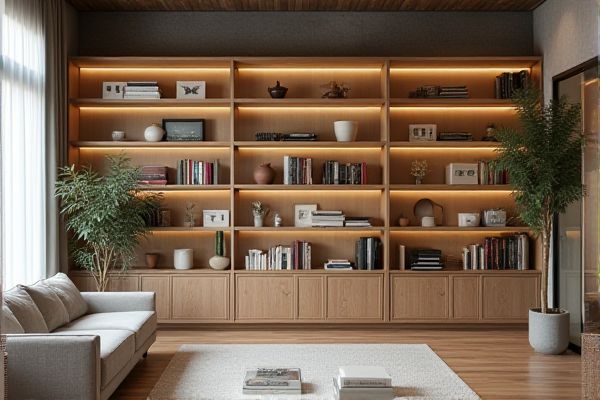
Resin shelving offers superior moisture resistance and durability, making it ideal for damp or heavy-use environments, while wood shelving provides a classic aesthetic and can be customized with stains and finishes for a warm, natural look. Discover which shelving option best suits Your space and needs by exploring the detailed comparison in the rest of this article.
Table of Comparison
| Feature | Resin Shelving | Wood Shelving |
|---|---|---|
| Material Composition | Durable synthetic resin, plastic-based | Natural hardwood or softwood |
| Durability | Waterproof, stain-resistant, rust-proof | Prone to moisture damage, warping, and pests |
| Weight Capacity | Moderate to high, depends on design | High, especially solid wood types |
| Maintenance | Low, easy to clean with soap and water | Requires polishing, sealing, and protection from moisture |
| Cost | Generally affordable and budget-friendly | Varies; hardwood is expensive, softwood is moderate |
| Appearance | Modern, uniform texture and finish | Classic, natural grain and warm look |
| Environmental Impact | Made from synthetic materials; less eco-friendly | Renewable resource; biodegradable if untreated |
| Typical Uses | Garages, basements, outdoor spaces | Living rooms, offices, decorative shelving |
| Assembly | Usually modular, easy snap-together parts | May require tools, nails, or screws |
Introduction to Resin and Wood Shelving
Resin shelving offers durability, moisture resistance, and easy maintenance, making it ideal for wet or high-humidity environments. Wood shelving provides a classic aesthetic with natural strength and can be customized through staining or painting to match your decor. Choosing between resin and wood shelving depends on the specific environment and your preferences for appearance and upkeep.
Material Composition and Characteristics
Resin shelving is made from synthetic polymers, offering high resistance to moisture, corrosion, and chemicals, making it ideal for damp or industrial environments. Wood shelving consists of natural timber, which provides a sturdy and aesthetically pleasing structure but requires treatment to prevent warping, insect damage, and moisture absorption. When choosing between resin and wood, consider your storage needs and environment to ensure Your shelves maintain durability and longevity.
Durability and Longevity Comparison
Resin shelving offers superior durability and resistance to moisture, chemicals, and corrosion compared to wood shelving, making it ideal for humid or harsh environments. Wood shelving, while sturdy and aesthetically pleasing, is prone to warping, cracking, and decay over time, especially without regular maintenance. Choosing resin shelving ensures Your storage solutions last longer with minimal upkeep in demanding conditions.
Weight Capacity and Load-Bearing Strength
Resin shelving offers superior weight capacity and load-bearing strength compared to wood shelving, making it ideal for heavy-duty storage. Unlike wood, resin shelves resist warping, cracking, and bending under substantial loads due to their reinforced plastic composition. Industrial-grade resin shelving can support weights up to 600 pounds per shelf, whereas typical wood shelves generally handle between 150 to 250 pounds before compromising structural integrity.
Design Versatility and Aesthetic Appeal
Resin shelving offers exceptional design versatility with a wide range of colors, finishes, and shapes that can mimic natural wood or create modern, sleek looks, enhancing any room's aesthetic appeal. Wood shelving, prized for its timeless beauty and natural grain patterns, provides warmth and character that resin often attempts to replicate but cannot fully match. Your choice depends on whether you prioritize customizable design options or authentic, classic aesthetics in your shelving.
Resistance to Moisture and Environmental Factors
Resin shelving offers superior resistance to moisture, preventing warping, rotting, and mold growth, making it ideal for humid or wet environments such as basements or bathrooms. Wood shelving, while aesthetically pleasing, is prone to damage from prolonged exposure to moisture and can deteriorate faster without proper sealing or treatment. Resin's durability against environmental factors like UV rays and temperature fluctuations ensures longer-lasting performance compared to traditional wood shelves.
Maintenance and Cleaning Requirements
Resin shelving requires minimal maintenance as it resists moisture, stains, and mold, allowing for easy cleaning with just soap and water. Wood shelving demands regular upkeep, including polishing and protection from humidity to prevent warping or cracking. The durability of resin ensures long-lasting cleanliness and low maintenance compared to the more delicate nature of wood shelving.
Installation Process and Flexibility
Resin shelving offers a straightforward installation process with lightweight panels and snap-together components that require minimal tools, making it ideal for quick assembly and adjustments. Wood shelving often demands precise measurements, drilling, and hardware, which can extend installation time and limit ease of modification. The inherent flexibility of resin shelves allows for easy resizing and repositioning, while wood shelving provides sturdiness but less adaptability for changing storage needs.
Cost Efficiency and Value Over Time
Resin shelving offers greater cost efficiency through lower upfront prices and minimal maintenance requirements compared to wood shelving, which often involves higher initial costs and ongoing treatments for preservation. Over time, resin shelves resist warping, moisture damage, and pests, providing durable value that reduces replacement and repair expenses. Wood shelving may add aesthetic appeal but can incur increased long-term costs due to vulnerability to environmental factors and wear.
Choosing the Best Shelving Option for Your Needs
Resin shelving offers superior moisture resistance and durability, making it ideal for garages, basements, or outdoor storage where humidity is a concern. Wood shelving provides a classic aesthetic and can support heavier loads but may be prone to warping or damage in damp environments. Selecting the best shelving option depends on the storage location, weight requirements, and maintenance preferences to ensure long-lasting performance and functionality.
 homyna.com
homyna.com